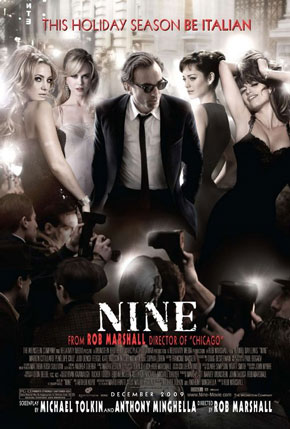
Baseball's Active Leaders, 2023
What Trump Said When About COVID
Recent Reviews
Everything Everywhere All at Once (2022)
Black Panther: Wakanda Forever (2022)
Doctor Strange in the Multiverse of Madness (2022)
Spider-Man: No Way Home (2021)
The Cagneys
A Midsummer Night's Dream (1935)
Something to Sing About (1937)
Angels with Dirty Faces (1938)
A Lion Is In the Streets (1953)
Man of a Thousand Faces (1957)
Never Steal Anything Small (1959)
Shake Hands With the Devil (1959)
Nine (2009)
WARNING: SPOILERS HERE...HERE...AND...(MMM)...HERE
I’m no marketer, so who am I to tell the Weinstein Co. how they should—or should have—marketed “Nine,” the Rob Marshall musical based upon the Broadway musical based upon Federico Fellini’s 1963 classic “8½.” But given the film’s weak opening box office, here’s a thought. Instead of the tagline, “This Holiday Season: Be Italian,” why not plaster the poster with one of those sexy shots of Penelope Cruz and use these lines of hers from the movie:
I’ll be here.
Waiting for you.
With my legs open.
When I sat down in the theater I knew I’d be seeing a lot of sexy women wearing sexy things and saying sexy lines but that was the jaw-dropper for me. I think I coughed in surprise when she said it. I may have whimpered. Her lines, her presence, complicate the life of film director Guido Contini (Daniel Day-Lewis), but here’s my thought, and probably the thought of every guy in the audience: I should have such problems.
“Nine” looks great but suffers from two problems: 1) Most of the songs are so-so, and 2) the drama is internal and circular. It’s tough enough for movies to dramatize the creative process. How do you dramatize the non-creative process?
Guido Contini is a director whose earlier films redefined Italy for much of the moviegoing world in the early 1960s but whose latest films flopped. Now it’s 1965 and he’s a week away from starting film no. 9, titled “Italia,” but he has no idea what the story will be. He fakes his way through a press conference, he fakes his way through talks with his producer, he ignores calls from his muse and star, Claudia (Nicole Kidman). His costume designer, Lilli (Judi Dench), tells him, as he lays prostrate on her desk, that directing isn’t that tough. “You just have to say yes or no, what else do you do? ‘Maestro, should this be red?’ ‘Yes.’ ‘Green?’ ‘No.’ ‘Yes,’ ‘no,’ ‘yes,’ ‘no.’” She tosses her hands in the air. “Directing.” Unfortunately Guido has no answers, no yes/no. Eventually he flees down the coast of Italy in his light blue Alfa Romeo. My thought, and probably the thought of every guy in the audience: I should flee in such a manner.
Guido flees into the arms of his mistress, Carla (Penelope Cruz). He thinks she’ll clear his head but she clutters it. Worse, the production company follows him down. Worse, his wife, Luisa (Marion Cotillard), follows him down. She sees Carla, sparks fly, Carla is banished, Carla tries to kill herself. What’s a man with so many women to do?
As responsibilities and women tug at him in all directions, Guido’s life, certainly his creative life, swirls uselessly away. Nothing gets the attention it needs. He’s not stable husband to Luisa nor steady paramour to Carla; he has no work for Lilli or Claudia. Each woman has her own musical number but most are hardly show-stoppers and most don’t move the story further along but simply reiterate what we already know. The one show-stopper, the song you hum coming out of the theater and wish you could sing with the full-throated passion the singer does, is “Be Italian,” sung by Saraghina (Fergie), the whore from Guido’s youth who would show the neighborhood boys this and that for coins. She’s his first lust, the woman who started him on this journey of loving women too much and not enough, and she tells him, singingly:
Be Italian, be Italian
Take a chance and try to steal a fiery kiss!
Be Italian, be Italian
When you hold don’t just hold me
But hold this! (clutches her breasts)
He’s stopped listening to this advice. He takes no chances and steals no kisses. Acclaimed and idolized, he’s the pursued now rather than the pursuer. Even a reporter from Vogue magazine, Stephanie (Kate Hudson), tries to get him into bed. Is the film suggesting a correlation between women and creativity? That when it becomes unnecessary to pursue the former, one is unable to pursue the latter? It’s all about practice. Fame has made Guido weak in the art of the pursuit.
Fergie, the one true singer in the bunch, belts it out, while the two main women in Guido’s life lock horns memorably. Cruz is pants-wettingly sexy while Cotillard is pained and effective. Her second number, “Take it All,” is staged as a burlesque, a sad striptease in which she gives up everything (the clothes are a metaphor) for this man who gives nothing back.
Meanwhile, Dench, in her musical number, “Folies Bergeres,” flashes cleavage and seems completely French (in conversation she seems completely British). She’s having a great old time.
The others? Hudson works fine, but the role is meaningless. Sophia Loren, playing Guido’s mother, has nothing to do. Kidman is an afterthought.
And Day-Lewis? It’s critically sacrilegious to write this but he may be wrong for the role. It’s not much fun watching him run circles in his head without having the decency to turn something into butter. Or. as Brando suggested, to get it.
The movie’s definitely missing oomph. Like Guido, it ignores the wisdom of Saraghina. Its British star is surrounded by actresses from France, Spain, Australia and America, leaving no one to be Italian.
—December 31, 2009
© 2010 Erik Lundegaard







